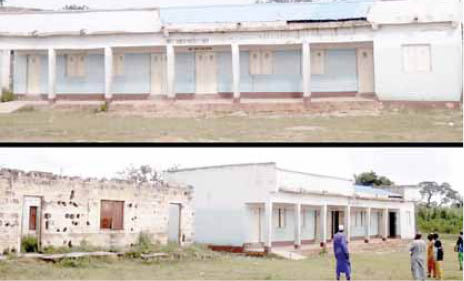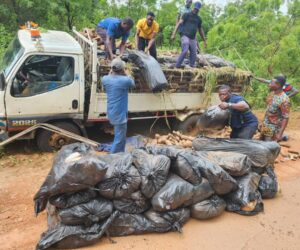Santar Kaku, a community in eastern Kankara along the Kankara–Ketare–Gora road in Kankara Local Government Area of Katsina State, is still reeling from years of devastating bandit attacks.
The once-thriving farming settlement is now struggling with acute shortages of food, water, education, and healthcare as residents make efforts to rebuild their shattered lives.
Katsina State has long been one of the epicentres of banditry in northern Nigeria, with repeated attacks causing loss of lives, displacement of families, and the destruction of livelihoods.
SPONSOR AD
Armed groups have continued to carry out raids, kidnappings, and cattle rustling, particularly in frontline local government areas.
Despite intensified military operations, the porous forest borders and easy access to firearms have continued to sustain insecurity across the North West subregion.
In response, several local councils, including Kankara, have initiated peace deals and dialogue with repentant bandits in a bid to restore stability.
These peace efforts, often supported by traditional and religious leaders, are designed to encourage armed groups to surrender their weapons in exchange for amnesty and reintegration support.
While some of these initiatives have brought temporary calm and facilitated the return of displaced persons, critics argue that the agreements remain fragile and could embolden criminal elements if not reinforced with strong security measures and socio-economic reforms.
Schools, hospitals in disrepair
A Daily Trust correspondent visited Santar Kaku village in Kankara LGA to assess the impact of the recent peace accord between the community and armed groups, as well as to document how residents are coping with current realities.
The people of Santar Kaku—mostly subsistence farmers—once harvested hundreds of bags of grain each season. Today, many depend on humanitarian aid and charity for survival.
Elderly men in their seventies and eighties have been forced to abandon their ancestral homes, while women have been widowed, violated, and left impoverished after years of relentless assaults.
The community, home to over ten thousand residents, now lives with decaying infrastructure — a broken primary school, no functional health facility, and inadequate access to clean water.
The only operational school block, built more than fifty years ago, is in severe disrepair. The dilapidated two-classroom structure accommodates dozens of pupils, with primary 1, 2, and 3 sharing one room, while primary 4, 5, and 6 crowd into the other — all seated on bare floors.
A resident, Muhammad Ahmad, lamented the hardship faced by the community, saying, “Indeed, we have been in a miserable situation. Our means of livelihood were destroyed, and we have lost almost everything to banditry. Once it’s 4 p.m., we live in fear. Many of us are sick and traumatised. We’re pleading for government intervention.”
Access to healthcare remains a distant dream for residents. With no functional clinic in the area, many are forced to travel several kilometres—often on foot—to the nearest health centre in Kankara town.
Water scarcity further compounds their hardship, as the entire community depends on a single hand pump, leading to long queues and daily struggles to fetch water.
Aminu Liman, another resident, said: “We suffer from acute water shortage. The only hand pump is not enough. People wait for hours daily just to fetch water, wasting valuable time.”
The plight of Santar Kaku reflects the dire condition of many rural communities across Katsina State still recovering from years of banditry. For these villages, peace is not merely a luxury but a last resort for survival.
Residents insist that rebuilding essential services such as education, healthcare, and water supply will help restore confidence and renew hope for Katsina’s long-suffering farming communities.
Mabai secondary school converted to military base
Another community in Katsina’s insecurity-bedevilled areas that is struggling with educational setbacks and environmental degradation resulting from years of banditry is Mabai, located in the same Kankara Local Government Area.
Mabai village, which established its first primary school in 1952, has produced hundreds of graduates now serving in various public and private sectors, contributing significantly to national development. However, years of persistent banditry have forced many children out of the school, inflicting severe damage on education in the area.
Children fortunate enough to remain in school study under dilapidated structures and unhealthy conditions, with many taking lessons in open spaces exposed to the elements.
Several classroom blocks have been destroyed by windstorms and abandoned for years, leaving limited facilities to accommodate pupils from both Mabai Primary School and Mabai Community Secondary School.
A resident, Muhammad Iliyasu, said they are grateful for the fragile peace being enjoyed at present but stressed that more must be done.
“Besides the restoration of peace to our communities, what is most important now is the rehabilitation and reconstruction of our dilapidated schools, hospitals, and other structures so that we can return to normal life,” he said.
Following the conversion of Mabai Community Secondary School into a military base, students were relocated to the village primary school — a move that overstretched the already limited facilities and worsened the area’s educational challenges.
Residents expressed concern over the fate of their children and called for lasting peace to enable the reopening of the secondary school.
Ahmad Bello, another resident, recalled the better days when children attended school without fear. “Now that the military has taken over our community secondary school, our hope is that as peace gradually returns, the soldiers will prepare to vacate the premises so that our children can resume classes soon,” he said.
Another pressing challenge is land encroachment by nearby residents, which threatens the available space for future school expansion and adds to the community’s concerns.
With a population exceeding 10,000, Mabai is not only grappling with educational decline but also facing severe soil erosion that has destroyed streets, homes, shops, trees, and social infrastructure.
The lack of a proper drainage system continues to endanger the village, making life unbearable—especially during the rainy season.
“As you can see, soil erosion is threatening this village. Along every street, the erosion is deep and spreading fast. It takes hours for rainwater to drain as it flows everywhere. We need urgent support for erosion control,” said another resident, Ismail Musa.
This situation reflects a broader crisis, as dozens of communities across insecure local governments in Katsina face similar infrastructure decay and environmental degradation.
Residents alike insist that these challenges demand urgent government intervention to restore peace, rebuild livelihoods, and promote social cohesion.







